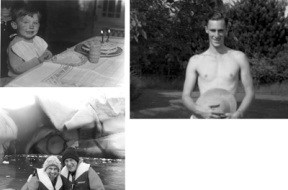Chuck Pope
Lopez Island
by Leta Currie Marshall
With his infectious, youthful enthusiasm, you might never guess that Chuck Pope is an eminent physician, researcher, and educator. He’s a Professor Emeritus of Medicine at the University of Washington, internationally known and respected for his expertise. To chat with him about his specialty, the esophagus, is to gain a new appreciation for that part of our anatomy.
“The esophagus looks like a pretty stupid tube, but it’s smarter than I am,” he says with a twinkle.
Chuck was born in Cleveland, Ohio, the older of two boys. During the Depression his family moved to the city’s outskirts to live with a grandmother. Chuck remembers shooting rabbits in her backyard, and also the day he looked at a rabbit and thought, “‘Why am I doing this?’ And I’ve never shot anything since.” After graduating from school he attended Cornell, then studied medicine at Case Western Reserve in his hometown. His research project concerned the effects of amino acids on potassium deficiency in rats. “We actually learned something,” he says, and the results of his study were published — the beginning of a lifetime of research and publication. During his residency at Strong Memorial Hospital in Rochester, N.Y., he was on track to become a pediatrician when he realized he just didn’t like hurting little kids. “I couldn’t explain to them why it was necessary. With adults, I could say, ‘This is gonna hurt. Wham!'” He switched to internal medicine and did two more years of residency at the University of Washington. There he helped pioneer permanent dialysis on the first three patients in the country to be placed on it. He was asked to set up a gastroenterology unit at the Seattle Veterans’ Administration hospital and ended up staying there over 30 years.
One of the more startling aspects of Chuck’s approach to work is his self-experimentation. He invented diagnostic tests to send down the esophagus, then tried them all on himself. “I’ve probably swallowed four or five hundred tubes in my career,” he says.
He has worked with some of the best doctors in the world, including the formidable Dame Sheila Sherlock of London’s Royal Hospital. “The esophagus even took me to Sweden,” Chuck says, where he was awarded an honorary medical degree. Through colleague Franz Engelfinger he met Augusto Larrain, a Chilean physician performing surgery to correct acid reflux. At Augusto’s invitation, Chuck attended a conference in Santiago in 1972, then went back in 1974 to work with him for three months. He was joined by his wife Jo and they stayed with Larrain and his new bride in their tiny house in the Andes, camping in the living room. By that time he and Jo had two kids, Cathy and John, who went to summer camp and stayed with relatives while their parents were in Chile. It was the year of the coup, and many people Chuck had met in ’72 were now in concentration camps. Anyone caught violating the midnight curfew was summarily shot. Chuck worked with Augusto at the thousand-bed Aguirre Hospital, where they found that 70 percent of the patients Augusto operated on for acid reflux were also cured of their asthma.
Chuck has great fondness for Chile and its people and has returned several times. He still collaborates with Dr. Augusto, studying the effects of drug combinations on snoring and sleep apnea. Chuck just received the results of the study on apnea, and says, “Nobody’s going to believe this.” The results are so spectacularly positive that Chuck expects the medical journals to be skeptical of the data and reject the study for publication, but he doesn’t plan to stop trying.
Chuck met his future wife Jo, also an Ohio native, at a mixer when she was in nurse training and he was in pre-med. Jo had her own career as a nurse in intensive care, the operating room, and then a cardiologist’s office, and she has been very active in Seattle and local hospice organizations. When their kids were young they lived in the Madrona area of central Seattle, designated one of President Lyndon Johnson’s “Model Cities.” Chuck is still very proud of his work as volunteer chair of the citizen task force on health, which included providing comprehensive health care to 1,000 citizens and tracking how they and the providers, Blue Cross/Blue Shield and Group Health, responded.
Chuck has truly enjoyed all the sectors of his career. “Medicine’s just been fun,” he says. “Ideas are wonderful.” He’s not quite retired — he still teaches the occasional “gut course” at the UW, although he says his knowledge is becoming obsolete because he doesn’t keep up with all the developments in medicine. “I’m like the Cheshire Cat — all that’s left is my smile.”
If you would like to suggest someone for Spotlight on Seniors please e-mail carmstrong@islandsweekly.net.



